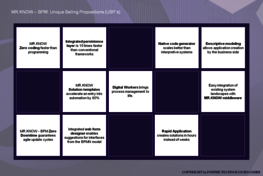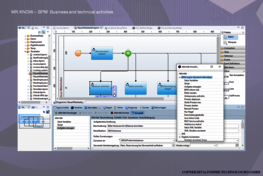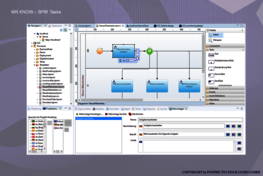Zero coding
Intelligent process automation (iBPM)
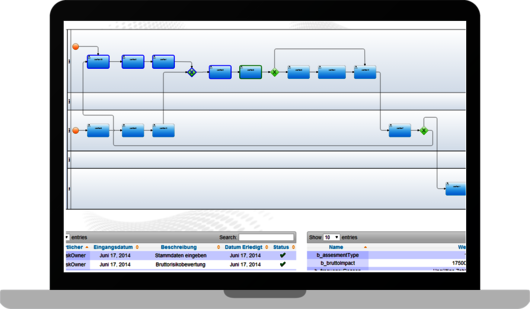
Intelligent process automation
With MR.KNOW - BPM Execution for Intelligent Process Automation (iBPMS), the individual business application for every specialist department becomes possible. Nowadays, solutions no longer have to be coded or developed in standard software beforehand. With model-based (BPMN 2.0) application creation, zero coding, our native code generator, and the use of artificial intelligence (AI) and digital workers (MR.KNOW), any project manager can digitalize processes across the board.
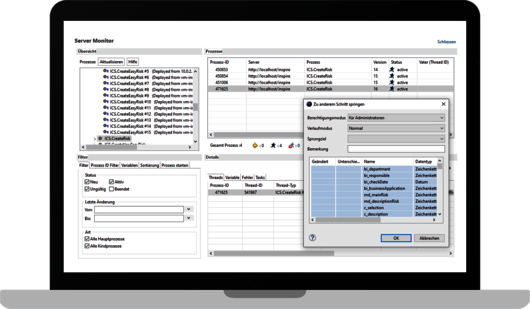
Making use of innovation.
Inspirational inventive spirit
We have been involved in process automation since 1996, and many well-known companies put their trust in our expertise. Our BPM software (BPMS) including Zero Coding has won awards as the most powerful engine from the Fraunhofer Institute, among others, as well as in numerous performance tests. With the native code generator that we have developed, we can therefore simply scale better than interpretive systems. It is no coincidence that we are regarded as the inventors of intelligent versioning and the adaptation of running process instances. In this way, we can inspire our customers again and again with numerous innovations.
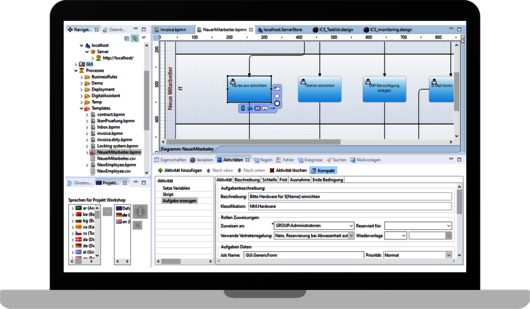
No compromises.
No more coding
With model-based application development, you reduce high development costs and bring your processes to life. In our BPM software (BPMS), automated activities can be derived directly from functional BPMN models, and business rules can be adapted. The system supports case management, Decision Model and Notation (DMN) tables and has a rule engine and integrated user management. As a special feature, suggestions for possible user interfaces and digital workers are already displayed with Rapid Application and Zero Coding. Of course, project managers can monitor, track and improve the processes at any time.

Integrating systems.
Have your data where it is needed
The MR.KNOW - BPM Middleware not only provides numerous interfaces such as ERP (SAP, Asseco, Wilken, Datev, MS Dynamics) and DMS, ECM, OCR, BI, RPA, Bots etc., but also makes it possible to connect existing IT systems by means of simple configuration. The integrated ESB light, modern web and REST services and open APIs also allow existing systems in the BPM software (BPMS) to be quickly incorporated into processes. Data, services, and DevOps can be managed easily and conveniently.
- Model-based application development
- Intelligent process automation
- Creation of entire applications by project managers
- Change of versions and process instances during live operation
- Excellent, powerful execution engine
- Native code generator instead of interpretation
- Integrated middleware (EAI) for enterprise integrations
- Numerous interfaces such as ERP, DMS, OCR etc.
- Different user directories can be connected in parallel
- Integrated own user and rights management
- Case Management, Rapid Application and Low Coding
- Decision Model and Notation (DMN) tables and Basic Rule Engine
- Intelligent versioning and adaptation of running process instances
- Modern web service and REST API layer as well as ESB light
- Business Activity Monitoring (BAM)
- Individual dashboards, reports and evaluations
General
- Context-based user experiences for customers
- Routine tasks are dealt with by the process control
- Process automation coordinates tasks and deadlines independently
- Improved customer service by means of faster processes
- Fewer time-consuming routine activities and reduced process costs
- Project managers can monitor, track and improve processes
- Model-based application development
- Bringing models to life and changing and adapting processes
- Intelligent process automation
- Ongoing process optimizations
- Activities can be automated directly from the domain-oriented BPMN process models
- Process changes with graphical models
- Intelligent versioning and adaptation of running process instances
- Communication between systems, processes and departments
- Group, role and rights management, and parallel integration of directory services
- Digital Process Automation (DPA)
- Low code approach for application development
- No Code Platform for digital workers
- Solution templates for an easy start
- Process automation 4.0 and therefore end-2-end digitalization
- Model-driven digitalization of human workflows (Model-Driven Digitalization)
- Automation of technical processes (Model-Driven Integration)
- Flexible change management
- Dynamic Case Management
- Generation of PDF/A and barcode support
- Security tests in accordance with TÜV Rheinland banking standards
Integrations
- Service-oriented architecture (SOA)
- Middleware with interface configuration
- Modern Web and REST service layer
- Web service layer including graphical mapping and WSI and non-WSI processing
- ESB light for orchestrating services
- ERP connections (including SAP, Asseco, Wilken, Datev etc.)
- Portals, including MS Sharepoint, Notes Domino, portal network / Single Digital Gateway VO etc.
- Data, e.g. OpenData, IBM Watson, KNIME etc.
- DMS / ECM, e.g. dg hyparchiv, Elo, Filenet, OpenText, Easy etc.
- Additional modules for OCR / Capturing and Business Intelligence (BI)
- User directories (e.g. Active Directory, Notes etc.)
- E-government options: De-Mail, XFall, XRechnung, OSCI, DCAT-AP-en, XÖV standards
- Round trips with functional modelling, process mining and RPA
- Easy and convenient management of data, services and DevOps
- Graphical schema editors (XSD) and integrated XML & Xpath editor
- Integrated extension component for integration projects (EAI) including EDI processing, Extract, Transform & Load (ETL), Change Data Capture (CDC), job duplications, listening of marketplace offers and library with preconfigured interfaces and adapters
- Interaction of processes and data
- Use of synchronized data for master data management
Technical
- MR.KNOW – BPM (formerly BPM inspire ) is a BPM Suite developed in Java.
- Sequential and parallel process execution
- MDA approach for native high performance execution rather than interpretation of process models
- High degree of proven scalability e.g. at Deutsche Post, Telekom / T-Systems, Best Western, Metro, SIXT, Obi, Siemens etc.
- The process engine can be embedded in any Java application
- Support of all JDBC-enabled databases and systems (Windows, Linux/Unix, OS) and any J2EE application servers and servlet engines (e.g. Tomcat, JBoss, GlassFish, IBM WebSphere, Oracle WebLogic, SAP, Equinox etc.)
- Own persistence layer including complete transaction control
- Server component is installed as a J2EE-compliant servlet
- Version change in the live process, and resolution of inconsistencies. Jumping and new variables in changing processes.
- Multiple instantiation of subprocesses


